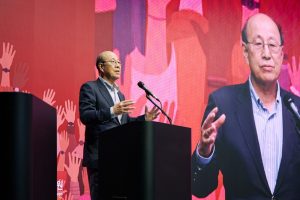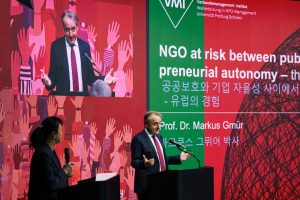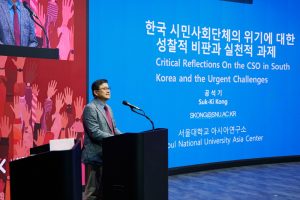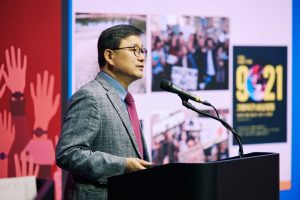2024 NPO.NGO Leadership International Conference
- Date: May 14th, Tuesday, 2024, 15:00 – 17:00
- Location: Studio 159, COEX
| Time | Program | |
| 2:00~2:20 | Session 1 Celebratory Ceremony of Publication |
Publication ceremony for the Korean edition of Fribourg Management Model for NPO
Emcee: Youngbo Shim /Congratulatory remarks: Dr. Jaewoong Ahn / Comments on the publication of the Korean edition: Markus Gmür |
| 2:25~2:30 | Session 2 International Seminar | |
| Opening remarks | Jonghan Lim Chairman, Social Value Management Institute, Professor, School of Medicine, Inha Univ. | |
| 2:30~2:37 | Congratulatory remarks | Hyun-Chin Lim Professor Emeritus, Dept. of Sociology, SNU, Establishing Director of SNUACFormer Chairman of the NGO Association, Former Chairman of the Committee for Civil Society Development |
| 2:40~3:00 | Keynote speech 1 | Suk-Ki Kong SNUAC Research Professor“Critical Reflections on the CSO in South Korea and the Urgent Challenges” |
| 3:00~3:30 | Keynote speech 2 | Markus Gmür Director, Institute for Research on Management of Associations, Foundations and Co-operatives (VMI) and Vice President of University of Fribourg, Switzerland“Crisis Management Leadership of NPO – Basic Principles and European Cases” |
| 3:30~3:45 | Coffee Break | |
| 3:45~5:00 | Roundtable | Topic: NPO/NGO Crisis Diagnosis and the Task of LeadershipKeynote speakers 1, 2 &
Wook Heo, Director, Social Value Management Institute (Moderator) Soonchul Yoon, Former Secretariat of the Citizens’ Coalition for Economic Justice Jik Geun Song, Executive Director, Mindlle Health Welfare Social Cooperative Naksub Jung, Former Director of Administrative Support, Beautiful Store Jaechan Ha, Executive Director, Korea Social Economy Network Floor Q&A Session |
On May 14th at 2 PM, an international conference titled “2024 NPO.NGO Leadership International Conference” was held in the Conference Room (Studio 519) on the 2nd floor of COEX. This event was co-hosted by the Social Value Management Institute, the Civil Society and NGOs Program of Seoul National University Asia Center, and the Nonprofit Management Institute of the University of Fribourg, Switzerland. The conference was also simultaneously broadcast live on YouTube. (Refer to the related poster and on-site photos.)
This international conference was organized to diagnose and find ways to overcome the crisis situations faced by non-profit/non-governmental organizations in Korea, which are currently experiencing significant internal and external challenges.
As widely recognized, the external environment surrounding civil society organizations—including political, economic, social, cultural, and digital trends—is rapidly changing. Additionally, internal issues such as the instability of organizational value systems, financial instability, difficulties in recruiting personnel, and challenges in democratic operations are intensifying. This event provided a valuable opportunity to hear diverse and in-depth perspectives on how NPO/NGO leadership can overcome these crises.
Hyun-Chin Lim, Director of the Civil Society and NGOs Program (and founding director of SNUAC), emphasized the need for active engagement with the crises faced by Korean civil society, civil society organizations, and citizens in a glocal context.
Keynote speeches included “Critical Reflections on the CSO in South Korea and the Urgent Challenges” by Dr. Suk-Ki Kong of SNUAC, and “Crisis Management Leadership in Nonprofit Organizations: Basic Principles and European Examples” by Markus Gmür, Director of the Nonprofit Management Institute of the University of Fribourg.
Dr. Suk-Ki Kong highlighted the importance of how civil society, civil society organizations, and citizens respond from the ground up to issues such as the recent digital revolution, convergence towards a platform economy, low birth rate, super-aging society, migration, multiculturalism, regional extinction, and caregiving. He emphasized that this response is at a critical juncture for revitalizing the crisis-stricken civil society sector.
Specifically, he presented five critical practical tasks for Korean civil society organizations: How can civil society regain its dynamism? How can it counter invisible domination through digital platforms and algocracy? How can it maintain a balanced attitude toward the MZ generation, who have turned away from civil society movements, and enable them to take the lead? How can it establish a virtuous resource mobilization mechanism that goes beyond traditional methods? What opportunities can it provide for future generations who dream of becoming ‘rooted cosmopolitans’?
During the subsequent roundtable discussion, four current and former activists with over 30 years of experience in the broader civil society sector expressed deep sympathy with the keynote presentations but also lamented the complex difficulties faced in the field. Through the discussion, it was emphasized that ongoing critical research is necessary to provide critical reflection and alternatives for Korean civil society organizations and that continued communication of various field experiences and theories is essential to apply the experiences of advanced countries in the Korean context.
Additionally, a pre-event ceremony was held on the day to commemorate the publication of the Korean edition of the Fribourg Management Model for NPO (10th edition) by the University of Fribourg Nonprofit Management Institute.





